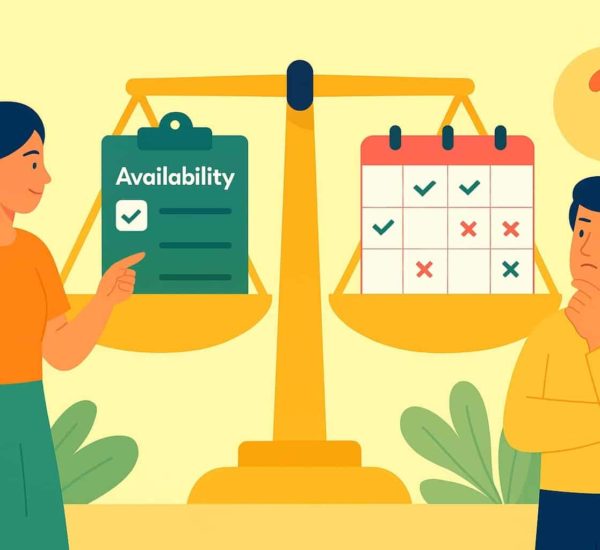Time management refers to the process of organizing and planning how to allocate time effectively and efficiently to achieve specific goals and objectives. It involves prioritizing tasks, scheduling activities, and making the most efficient use of available time. Good time management skills allow individuals to work smarter, not harder, by focusing on high-priority tasks and avoiding procrastination and time-wasting activities.
Effective time management can lead to several benefits, such as increased productivity, better work-life balance, reduced stress levels, and improved overall performance. It requires self-discipline, self-awareness, and a willingness to make changes to one’s work habits and routines.
But to put it incredibly simply, time management is the skill that differentiates stressed individuals from relaxed ones.
How, do you ask? Let’s find out in this blog with 15 time management tips to work smarter and not harder.
Time Management Tip #1: Prioritize, Prioritize, and Prioritize Some More
Prioritizing tasks is a crucial component of effective time management. By prioritizing tasks, individuals can focus their energy and attention on the most important and urgent tasks, rather than becoming overwhelmed by the sheer number of tasks to be completed.
Start by making a list of all the tasks that need to be completed. This can be done using a to-do list or a planner. Categorize each task based on its level of urgency and importance. Urgent tasks are those that require immediate attention, while important tasks are those that contribute significantly to your long-term goals.
Use the Eisenhower Matrix, a popular time management tool, to determine the priority of each task. The matrix separates tasks into four categories: important and urgent, important but not urgent, urgent but not important, and not urgent and not important. Once tasks have been categorized, reorder the list based on their priority. Tasks that are both urgent and important should be completed first, followed by important but not urgent tasks.
Allocate time for each task based on its level of priority. This helps to ensure that the most important tasks receive adequate attention and are not pushed aside by less important tasks. Be prepared to adjust priorities as needed. Circumstances can change, and new tasks may arise that require immediate attention.
Time Management Tip #2: Set Goals, SMART or Otherwise
Goal setting is an important aspect of time management. Setting clear and specific goals helps individuals to focus their efforts and manage their time more effectively.
Begin by identifying what you want to achieve. This could be a long-term goal, such as completing a project or earning a degree, or a short-term goal, such as finishing a task by the end of the day. Make your goals Specific, Measurable, Achievable, Relevant, and Time-bound (SMART). Clear and well-defined goals ensure that you and your team understand what you need to achieve and why.
Create a plan of action to achieve each goal. This plan should include specific tasks, deadlines, and resources needed to complete each goal. Regularly track your progress and make adjustments as needed. This helps you to stay on track and adjust your plan as circumstances change.
Time Management Tip #3: Your Schedule is Your Best Friend
Scheduling allows individuals to plan out their day or week in advance, ensuring that they use their time efficiently and effectively.
A schedule allows individuals to prioritize their tasks and allocate their time accordingly. By setting aside time for high-priority tasks, individuals can ensure that they are completing the most important work first. Scheduling can also involve time blocking, which means setting aside specific blocks of time for different tasks or activities. This helps to ensure that there is enough time for each task and that interruptions and distractions are minimized.
If you’re like me and end up procrastinating till the 11th hour, creating a schedule and sticking to it can help mitigate the last-minute chaos of deadlines.
Time Management Tip #4: Manage Distractions
Distractions can come from anywhere. The constant pinging of social network notifications, your adorable Golden Retriever that’s just begging for scratches, or even the noise of a bustling household.
Start by identifying these sources of distraction and learn to manage them. That can mean noise-canceling headphones in your private office where you keep your phone on silent for an hour at a time. You then get a quick 10-minute breather to take a gander at your distractions and be back to work post that.
Time Management Tip #5: Take Breaks Often
Not all breaks are the same. And if you’re not taking any during your remote workday, you’re probably terrible at your job.
In an average 8-hour workday, an employee is only productive for 2 hours and 53 minutes. While slightly concerning, these figures are probably the result of not taking enough breaks. There are many styles of taking breaks and working. For instance, the Pomodoro Technique suggests that you work for a 25-minute chunk and then take a quick 5-minute break. After 3 hours, take a longer 20-minute break, and so on.
Whatever break style you opt for, be sure to have one to remain productive and manage time effectively.
Time Management Tip #6: Batch Similar Tasks Together
Batching tasks is a time management strategy that involves grouping similar tasks together and completing them in a focused and efficient manner. When individuals switch between different types of tasks, it can take time to shift focus and regain momentum. By batching similar tasks together, individuals can reduce the amount of time spent switching between different types of work.
By completing similar tasks together, individuals can develop a rhythm and complete them more quickly and efficiently. This can help to reduce the overall amount of time spent on these types of tasks. Batching can also save time by reducing the need to switch between different types of work or tools. For example, if an individual needs to use a specific tool to complete a task, it may be more efficient to complete all tasks that require that tool at once.
Time Management Tip #7: Use Productivity Tools
AttendanceBot helps remote teams manage their time and attendance more effectively, making it a productivity tool for remote teams; which can ultimately lead to improved productivity.
AttendanceBot allows team members to track their time accurately. Helping them understand how much time they spend on different tasks and projects.
It provides real-time reporting and analytics, which can help team leaders track attendance, productivity, and other key metrics. This information can be used to make data-driven decisions and identify areas where productivity can be improved.
Overall, by streamlining time tracking and attendance management, AttendanceBot can help remote teams save time and improve productivity. Allowing team members to focus on more important tasks and achieve better results.
Time Management Tip #8: Don’t Chase Inbox Zero Everyday
Chasing the allure of Inbox Zero can be fun but also exhausting. Constantly checking emails and replying as soon as they drop in, can be leading to unnecessary context switching.
By checking email less frequently, individuals can reduce the number of interruptions throughout the day, allowing them to concentrate more fully on important tasks. Block out specific times on your calendar for email management, such as first thing in the morning, mid-day, and end of the day. You can pick a time when you are the least productive, since answering emails doesn’t require as much engagement.
Turn off email notifications during the day to reduce incessant interruptions that are wasting your time.
Of course, there is a caveat. If your job requires you to answer emails within a certain time frame, do make sure to check your emails more often during the day.

Time Management Tip #9: Healthy Habits after Work Impacts Work
Engaging in healthy habits such as regular exercise, healthy eating, and sufficient sleep can increase energy levels, allowing individuals to be more productive and efficient throughout the day. Developing healthy personal habits requires discipline and structure, which can also improve overall time management skills.
Be sure to get in those 8 hours of sleep and an hour of exercise to really be in peak productivity.
Time Management Tip #10: Plan Your Work Week on a Sunday
Starting your workweek with a plan can help you stay focused on your most important tasks. While also making it easier to transition from the relaxed weekend mindset to a productive Monday morning work mentality.
To ensure a successful week, take a few minutes on Sunday to create a plan that breaks down your weekly goals into smaller, daily tasks.
To optimize your energy and creativity levels, schedule demanding tasks for Tuesday and Wednesday when you are likely to be at your peak. Save low-priority tasks for Fridays and other low-energy times. Use Thursdays for meetings since it’s a day when your team’s energy starts flagging.
Conclusion
It’s essential to remember that no single time management strategy works for everyone. Finding the right combination of strategies that work for an individual’s unique situation takes time and experimentation. It’s also important to remain flexible and adapt as needed to maintain productivity and efficiency.





